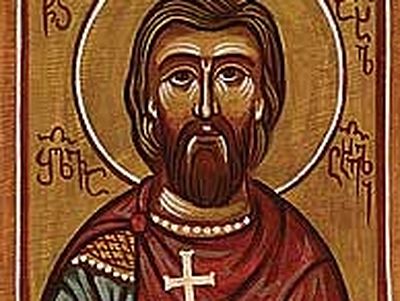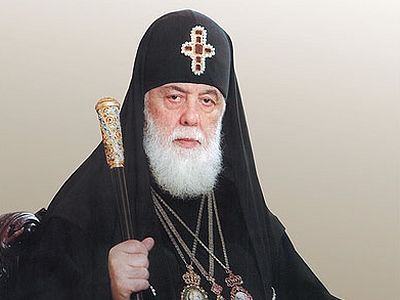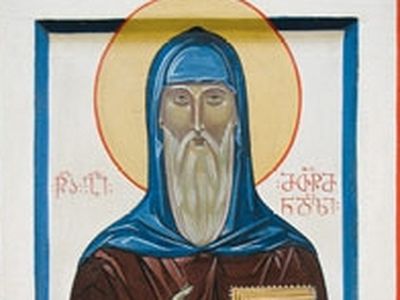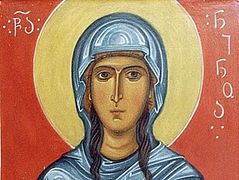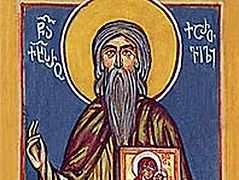Memory 21 June (4 July)
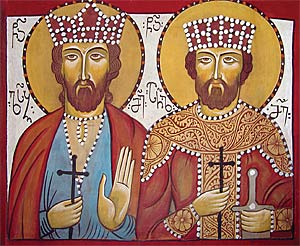 Holy Royal Martyrs Luarsab and Archil Holy Royal Martyrs Luarsab and Archil |
| Holy Royal Martyrs Luarsab and Archil |
When the Muslim military leader Marwan bin Muhammad (called “the Deaf”) besieged Georgia early in the 8th century, a certain Mir, the older brother of Archil, was ruling Kartli. The armies of the ruthless invader pillaged everything in their path. Seeing this, the crown-bearing brothers Mir and Archil fled to western Georgia and, praying fervently to God and the Most Holy Theotokos for help, prepared for battle.
The Lord heard the prayers of the faithful brothers: One night the Most Holy Virgin appeared to St. Archil and told him, “Arise and take up your arms against the unbelievers, for the holy angels will be your companions and the Lord God will stand at your side!”
Trusting in the Lord and the grace of the Most Holy Theotokos, Mir and Archil attacked the army’s camp with their own small force and succeeded in driving out the enemy. Then God sent a severe rainstorm, and the river overflowed and drowned the unbelievers as they were crossing it. The few who remained alive made their way to the sea, hoping to reach Constantinople, but the right hand of the Most High drowned them in the waters of the sea.
King Mir, wounded in the battle and declining in health, designated his brother Archil heir to the Georgian kingdom. Archil remained in Kutaisi for twelve years, struggling tirelessly to reunify his country. Having freed Kartli, King Archil began to reunite the regions of Kakheti, Tianeti, Egrisi, Abkhazeti and Samtskhe-Javakheti. During his rule, the Arab-Muslim occupation spread no farther than Tbilisi and Mtskheta.
While the country that Marwan had destroyed was still recovering, a new generation of Muslim invaders, under the leadership of Chichum Asim,[1] ravaged Kartli and began marching toward Kakheti. Still bleeding from its earlier wounds, Georgia had no strength to resist.
The holy king Archil resolved to lay down his life for the Christian people, and he journeyed to the Muslim leader to plead for a truce. Chichum Asim received King Archil respectfully, but he soon attempted to deceive him with flattering speeches, and he demanded that the king convert to Islam. Seeing clearly through Chichum’s ruse, St. Archil told him, “If I heed your words, I will suffer eternal condemnation. Our God and Savior sacrificed Himself for our redemption, thus I have no reason to fear death. If you choose to kill me, I will rise up like our Lord and glorify Him again!”
The enraged Chichum ordered his servants to cast King Archil in prison and torture him for his uncompromising faith. Soon after, a Muslim man from Armenia arrived. He desired revenge for supposed wrongs done to his family by one of Archil’s ancestors. Therefore he sought to betray the righteous king by informing Chichum that Archil was descended from the royal line that included Kings Mirian and Vakhtang Gorgasali. In addition he told Chichum that Archil knew where the Kartlian king Mir and the Byzantine emperor Heraclius had hidden their wealth.
Chichum summoned the king and said to him: “Previously I admired you both for your kindness and your beauty. For I beheld you to be the most comely among men. And now I have been told that you are a descendant of the great Chosroid’s dynasty. Therefore, if you will obey me, you will be held in even greater esteem before me than anyone else. Your kingdom will belong to you, and the treasure of your ancestors will be returned once again to you. Just tell me where the treasures of the Greek emperor Heraclius were buried, and then convert to our faith. Then you will be like us, a faithful follower of the great prophet Muhammad.”
St. Archil replied to this deceptive speech: “I know nothing of where the Greek treasure was hidden as I was very young when Heraclius marched through our country. As for my father and brother, they hid their treasure in the fortress that Marwan marched against. Since recent times that treasure has been kept in the land of the Greeks. And in reply to your second request — to convert to your faith—I tell you that I will never deny my Lord, nor will I exchange the future eternal life for this quickly passing one.”
“Were you there when the Arabs were defeated in Abkhazeti?” the furious Asim demanded.
With great courage and composure St. Archil answered, “The Life-giving God and Creator of heaven and earth came down from heaven to save mankind and by His death to slay our slayers, granting us immortality. He, the Almighty and Victorious, toppled and crushed them long before my own time.”
The outraged Chichum Asim bellowed, “If you have no desire for life and prosperity and would prefer to hope in one who is dead, then it is fitting for you to die!”
Chichum’s servants then escorted the king to his execution. King Archil requested a few minutes to pray. He knelt, lifting up his hands and thanking the Creator, and prayed to our Savior for the protection of His Church and the strengthening of the Christian Faith in Georgia. Then he prayed for his family and peacefully bowed his head before the executioners.
At night the king’s devoted servants came in secret and stole the body of the holy martyr. With great honor they buried his holy relics at Notkora Church, which he had himself built. This happened in the year 744.[2]
St. Luarsab was the only son of King Giorgi X of Kartli. In the year 1606 Luarsab was crowned king, at the age of fourteen. In the same year, Giorgi III of Imereti (1606–1639) and Teimuraz I of Kakheti (1606–1668) were also crowned kings.
In 1609 the Turks and the Crimean Tatars attacked Kartli without warning. At that time King Luarsab was at his summer home, and it is likely that he would have perished in the invasion were it not for the heroic priest Tevdore. Fr. Tevdore deceived the enemy’s army by leading them in the direction opposite of Tskhireti Castle, and thus buying King Luarsab sufficient time to gather his troops and annihilate the invaders near Tashiskari. King Luarsab was just seventeen years old at that time.
Meanwhile, the Persian ruler Shah Abbas I was plotting to capture eastern Georgia. Shah Abbas promised Teimuraz all the land of Kartli in return for the murder of King Luarsab. Likewise, he offered Luarsab all of Kakheti in return for the murder of King Teimuraz. But the young kings were quick to recognize the shah’s evil scheme and, according to God’s will, Georgia was saved from fratricide.
Shah Abbas, alarmed by the concord between the Georgian kings, resolved to eliminate them both in a single stroke: he invited the kings to go hunting and plotted to kill them during the hunt. But again the young kings recognized the shah’s true intentions, and they swore to one another to “lay down their souls for Christ.” They declined the shah’s offer and proposed to meet in open confrontation instead. Having lost the skirmish, they fled to Imereti, where King Giorgi received them with much gladness.
Shah Abbas laid waste to the already devastated regions of Kartli and Kakheti, then encamped near Gori and demanded that King Giorgi surrender Luarsab and Teimuraz. When King Giorgi refused, the treacherous shah resorted to another scheme: he summoned Luarsab’s tutor, Prince Shadiman Baratashvili, and charged him to find and deliver the elusive king Luarsab.
With flattering lips and a lying tongue, Shah Abbas succeeded in bringing the young king before him. He appointed a new ruler for Kartli and commanded an army to protect the region. The valiant and faithful king Luarsab knew that he would not be spared from the bloodthirsty Abbas, and he struggled to endure his tribulations with dignity and composure, for the glory of God.
Soon the Great Fast arrived, and Shah Abbas planned a sumptuous feast. He secretly ordered that a plate of fish be brought for Luarsab, but the pious king would not touch it. Instead he told his oppressor, “Today you want me to break my fast by eating fish, tomorrow you will offer me meat, and finally you will demand that I renounce the Christian Faith!”
As anticipated, the shah demanded that Luarsab deny Christ and recognize Allah as God, but the king answered him bravely, saying, “I will not fulfill your command for anything in the world. I have been baptized in the Name of Christ and only in Him will I believe!” The king was arrested, escorted to Shiraz, and imprisoned. For seven years a group of mullahs came to him daily to persuade him to convert to Islam and “spare his youth,” rather than suffer torture and death. In the end Shah Abbas realized that all his efforts had been in vain, and he ordered Luarsab’s execution.
The holy martyr King Luarsab was strangled to death with a bowstring. That night a brilliant light illumined his lifeless body, and the next day his holy relics were buried in the prison yard. This occurred in 1622, when St. Luarsab was thirty-five years old.
One thousand years separate the lives of St. Archil and St. Luarsab, but the Georgian Church saw fit to commemorate them on the same day. Catholicos-Patriarch Leonid (†1921) wrote of the similar fates of the two kings: “Our exhausted and long-suffering nation is always experiencing the same sorrow, the same struggle.”He lamented that the holy relics of St. Luarsab are still in Persia and that the location of St. Archil’s grave is unknown to the Church today.
O Holy Martyrs and Right-believing Kings Archil and Luarsab, entreat Christ God to deliver us from every iniquity!
[1] Apparently this is Khuzaim bin Khazim, the caliph’s viceroy of Armenia.
[2] Historians are divided as to the date of St. Archil’s martyrdom. For a full study of the subject see Cyril Toumanoff, Studies in Christian Caucasian History (Washington D.C.: Georgetown University Press, 1963), pp. 394–95.

